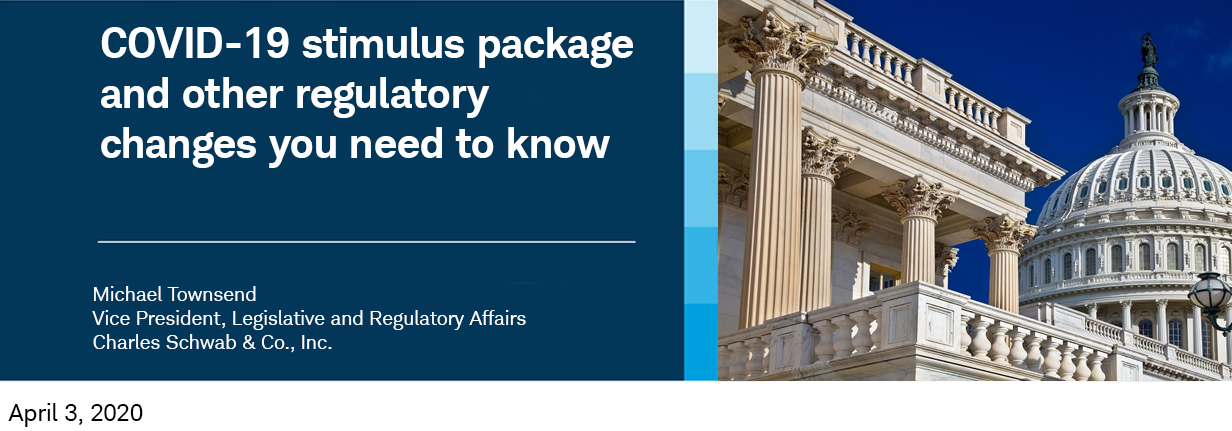
Key takeaways
- CARES Act: Congress passed the largest stimulus bill in history to help mitigate the economic impact of COVID-19. The new law includes required minimum distribution and other retirement savings changes.
-
Tax Day: The federal income tax deadline for filing 2019 returns is now July 15, 2020.
-
Other regulatory developments: Despite speculation, the implementation date for Regulation Best Interest has not changed. But advertising and solicitation rules will likely be tabled for now.
View recent market volatility updates from Schwab
Summary
Congress moved at breakneck speed to provide relief for businesses and individuals. Here are the top regulatory actions investment advisors should monitor.
As the world struggles against the coronavirus pandemic, the role of Registered Investment Advisors (RIAs) has never been more important. Clients need your support to navigate these unprecedented times.
Washington has been busy. Congress quickly approved three coronavirus relief and economic stimulus bills while regulators continue to make adjustments to rules to provide additional relief to individuals and businesses. Information is changing rapidly, adding to a highly dynamic situation. Here is a broad look at the recently passed legislation and an update on key developments for investment advisors and their clients as of March 30:
CARES Act overview
On March 27, the president signed into law the Coronavirus Aid, Relief, and Economic Stability (CARES) Act, the largest stimulus bill Congress has ever approved. The $2.2 trillion bill came together in just 10 days after intense bipartisan negotiations led by Treasury Secretary Steven Mnuchin and Senate Minority Leader Charles Schumer (D-NY). The bill was approved 96–0 in the Senate and passed by voice vote in the House of Representatives. Key elements of the new law include:
- $532 billion for large businesses and local governments
- $377 billion for small businesses
- Estimated to total $300 billion in direct payments to families in the form of $1,200 checks ($2,400 for couples) plus $500 per child to individuals earning $75,000 or less ($150,000 for couples)
- $260 billion in expanded unemployment benefits
- $150 billion in direct aid for states and municipalities
- $125 billion for hospitals and other health care providers
New law offers help for those with retirement accounts
For individual investors, significant changes to retirement savings are some of the most critical provisions in the new law:
- RMDs waived for 2020. Required minimum distributions (RMDs) from IRAs and most 401(k)-type defined contribution plans have been waived for 2020. The relaxing of rules is intended to help retirement accounts recover from losses. However, it could potentially confuse clients, because the age at which an individual must begin taking an RMD recently changed from 70½ to 72. Now no retiree, regardless of age, is required to take a distribution this year.
Several questions about this provision are not specifically addressed in the CARES Act, including whether a client who took an RMD early in 2020 can roll it back outside the normal 60-day window. This and other questions are expected to be addressed in IRS guidance in the coming weeks. - Special hardship withdrawals from retirement accounts. Individuals affected by the coronavirus may take a penalty-free hardship withdrawal of up to $100,000 from a retirement account. Those who take this withdrawal would owe taxes, but repayment of both the taxes and the withdrawal may be spread over three years, and any repayment will not count against the contribution limit for that year. Moreover, an individual who repays the withdrawn amount is eligible for a refund of the taxes paid on the withdrawal.
- Increased loan maximums; no repayment in first year. Instead of a withdrawal, an individual may take a loan of up to $100,000 (an increase over the usual maximum of $50,000) from a retirement account. The normal 50% of account balance limit would be temporarily waived. The loan must be taken within 180 days of the law’s enactment on March 27. In addition, no loan repayment is required for the first year.
Tax Day changes
The IRS has changed the federal tax filing deadline from April 15 to July 15. The deadline for making a 2019 IRA contribution also has been extended to July 15. Most states—but not all—have changed their filing deadlines to align with the new federal date, but investment advisors should be sure to confirm with the state tax authority whether a particular state has finalized the date change.
Aid for RIAs as small businesses
The CARES Act relief package for small businesses makes many investment advisory and wealth management firms eligible for aid. The U.S. Small Business Administration (SBA) has streamlined the application procedure for emergency disaster loans. Investment advisors who want to explore the options available for aid should visit the SBA’s coronavirus emergency hub.
RIAs get a reprieve from Form ADV filing deadline
The SEC recently announced that it is granting investment advisory firms affected by the coronavirus an additional 45 days to file Form ADVs that were originally due between March 13 and June 30. Investment advisors who want to take advantage of the extension must inform the SEC and their clients. They must say they are relying on the SEC’s order to delay their ADVs but do not need to explain why. In addition, the SEC’s Office of Compliance Inspections and Examinations said recently that a firm’s request for such an extension would not be considered a risk factor in determining whether a firm will be subject to an investigation.
Other regulatory developments
With the SEC, like most businesses, operating at reduced on-site capacity, many regulatory actions have been delayed. Here are the issues in the regulatory queue at the SEC that investment advisors should monitor:
- Regulation Best Interest: The compliance date of June 30 for the new best-interest standard is rapidly approaching. In January and again in February, the SEC updated a series of frequently asked questions the new regulation raises. And the agency is expected to add questions and responses in the weeks ahead.
While there has been considerable speculation about whether the SEC would delay the implementation date of Reg BI, or perhaps announce that the enforcement of the new rules would be delayed until after the pandemic is under control, there has been no formal announcement as of March 30. Investment advisors should therefore continue to plan for the rules to go into effect as scheduled. - Advertising and solicitation rules: Meanwhile, in February the public comment period closed on the SEC’s proposed overhaul of the advertising and solicitation rules for investment advisors. It garnered a relatively modest response of about 70 comment letters. The industry has long desired changes to these rules, which have been on the books since 1961 and 1979, respectively. However, there is considerable debate about the specific proposals put forward by the SEC. The advertising rule changes are of particular interest to investment advisors. They would permit the use of testimonials, endorsements, third-party ratings, and performance results, subject to various requirements. The SEC is reviewing the comments and considering whether alterations to the rule proposal are warranted. There is no deadline by which the SEC must finalize the rule, and the coronavirus outbreak has likely put these rules on the back burner, at least temporarily.








